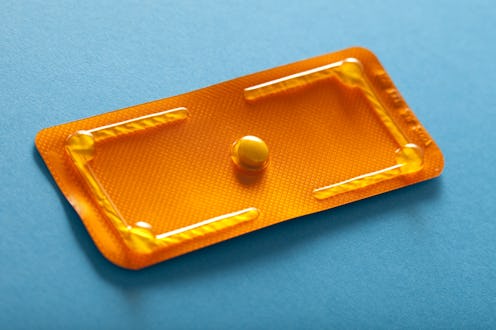Life
Here's Why Those Common Myths About The Morning-After Pill Are Untrue

The morning-after pill is accessible without prescription in the UK, and often available for free. But myths and misunderstandings continue to surround it, which can prevent people from using the emergency contraception they need. One of the most persistent questions: is the morning after pill safe? The answer, in short, is yes, but I talked to several experts to get the full details on the emergency contraceptive pill and its use.
First, a quick overview of how the morning-after pill works. There are two types available in the UK, Levonelle and ellaOne; both, according to the NHS, stop or delay ovulation to prevent pregnancy. Levonelle contains levonorgestrel, the NHS says, which is a synthetic form of the ovarian hormone progesterone. It must be taken within three days of sex to be effective. ellaOne, meanwhile, contains ulipristal acetate — this "stops progesterone", the NHS says. ellaOne is effective up to five days after having unprotected sex. FPA points out that the term "morning-after pill" isn't all that accurate, since neither of the available pills must be taken within 24 hours.
The morning-after pill isn't, however, the most effective form of emergency contraception available: that title, the NHS says, belongs to the IUD or copper coil, which has a failure rate of under 1 percent. Though there aren't concrete figures for the success of the morning-after pill, the NHS cites a 2010 paper which showed that of 1,714 people “who received ulipristal acetate (or ellaOne), 22 (1.3 percent) became pregnant" while of 1,731 people “who received levonorgestrel (or Levonelle), 38 (2.2 percent) became pregnant." The National Institute for Health and Care Excellence (NICE) now recommends that people asking for the morning-after pill be told that IUDs are more effective at preventing pregnancy.
Despite popular misconceptions, experts stress that the morning-after pill is completely safe to take, and has no long-term effects. Tracey Forsyth, lead contraception nurse at the British Pregnancy Advisory Service (BPAS), tells Bustle that, "people can use it as many times as they want." Bekki Burbidge, deputy chief executive of sexual health charity FPA (formerly known as the Family Planning Association), says, "All types of emergency contraceptive pill are very safe, with no serious side effects."
According to Burbidge, "some people feel sick or get headaches or painful periods after taking emergency contraception and a small number of people will be sick after taking it." The NHS advises users to "get medical attention if you're sick within 2 hours of taking Levonelle or 3 hours of taking ellaOne, as you'll need to take another dose or have an IUD fitted."
A common myth holds that the morning-after pill — particularly when used repeatedly — can impact fertility, a notion both Burbidge and Forsyth say is false. "You can take the emergency pill as many times as you need to. There are no dangers to your health or fertility," Burbidge says. "But it’s important to remember that it’s not as effective as regular methods of contraception, so if you need emergency contraception on a regular basis it might be time to think about switching to a different regular contraceptive method."
Another misconception? That the morning-after pill induces an abortion. That's incorrect — the pill works, as described above, by preventing or delaying ovulation. Tracey Forsyth tells Bustle, "Medical research and legal judgement is quite clear that emergency contraception is not an abortion." It's important, however, to note the problematic implication of that myth, rather than simply dispelling it. Aborting a pregnancy is in no way less morally permissible than preventing ovulation, and neither abortion nor the morning after pill should be stigmatised.
The morning-after pill can be obtained free of charge from some GP surgeries, contraception or sexual health clinics, walk-in centres, some A&E departments, and some pharmacies, the NHS says. Major pharmacies like Boots, Superdrug, and Lloyds Pharmacy sell the pill at varying prices: according to the Guardian, a generic form of levonorgestrel is available at Boots for £15.99, and at Superdrug, Asda, Tesco, Morrisons, and others for about £13.50.
Boots' prices have previously been the source of controversy: as the Guardian reports, their more affordable levonorgestrel pill was released after "Labour MPs, the former Conservative minister Anna Soubry and sexual health campaigners heavily criticised its refusal in July to drop the price of the two other versions of EHC it sells." Boots sells Levonelle for £28.25, and another generic version for £26.75, while Tesco, for instance, sells Levonelle for £13.50. ellaOne, according to iNews, usually costs about £35 across all pharmacies.
Both Bekki Burbidge and Tracey Forsyth think the morning-after pill should be more accessible. "Most pharmacies can supply emergency pills so they’re generally very easy to get hold of — but we’d prefer to see emergency contraception universally available for free so that there are no barriers for people who can’t afford to pay," Burbidge tells Bustle.
She adds, "Although services such as GPs, walk-in centres and clinics provide emergency contraception free of charge, it can be hard to get a prompt appointment or you may experience long waiting times at a walk in service."
Forsyth also notes that "having to speak to somebody about it" can prevent people from accessing the morning-after pill. People “are still embarrassed about going to get hormonal contraception," she says. Indeed, a 2014 study conducted by FPA revealed that 52 percent of 16 to 24-year-olds think there's a stigma attached to doing so. And for people to get the emergency contraception they need, that's a stigma we need to dispel.
Let's recap: the morning-after pill is safe to take, with no lasting impact on health or fertility no matter how many times it's taken. It's not the only form of emergency contraception; in fact, it's less effective than the IUD or copper coil. And it's not the same as an abortion — though like abortion, it should be accessible to those who need it, and entirely stigma-free.